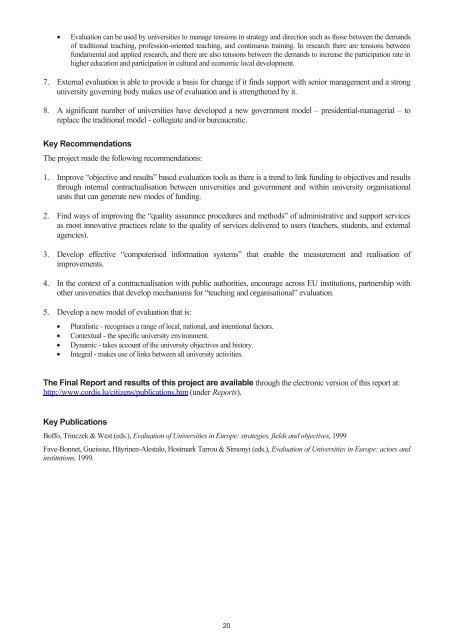briefing papers for policy makers
briefing papers for policy makers
briefing papers for policy makers
Create successful ePaper yourself
Turn your PDF publications into a flip-book with our unique Google optimized e-Paper software.
• Evaluation can be used by universities to manage tensions in strategy and direction such as those between the demands<br />
of traditional teaching, profession-oriented teaching, and continuous training. In research there are tensions between<br />
fundamental and applied research, and there are also tensions between the demands to increase the participation rate in<br />
higher education and participation in cultural and economic local development.<br />
7. External evaluation is able to provide a basis <strong>for</strong> change if it finds support with senior management and a strong<br />
university governing body makes use of evaluation and is strengthened by it.<br />
8. A significant number of universities have developed a new government model – presidential-managerial – to<br />
replace the traditional model - collegiate and/or bureaucratic.<br />
Key Recommendations<br />
The project made the following recommendations:<br />
1. Improve “objective and results” based evaluation tools as there is a trend to link funding to objectives and results<br />
through internal contractualisation between universities and government and within university organisational<br />
units that can generate new modes of funding.<br />
2. Find ways of improving the “quality assurance procedures and methods” of administrative and support services<br />
as most innovative practices relate to the quality of services delivered to users (teachers, students, and external<br />
agencies).<br />
3. Develop effective “computerised in<strong>for</strong>mation systems” that enable the measurement and realisation of<br />
improvements.<br />
4. In the context of a contractualisation with public authorities, encourage across EU institutions, partnership with<br />
other universities that develop mechanisms <strong>for</strong> “teaching and organisational” evaluation.<br />
5. Develop a new model of evaluation that is:<br />
• Pluralistic - recognises a range of local, national, and intentional factors.<br />
• Contextual - the specific university environment.<br />
• Dynamic - takes account of the university objectives and history.<br />
• Integral - makes use of links between all university activities.<br />
The Final Report and results of this project are available through the electronic version of this report at:<br />
http://www.cordis.lu/citizens/publications.htm (under Reports).<br />
Key Publications<br />
Boffo, Trinczek & West (eds.), Evaluation of Universities in Europe: strategies, fields and objectives, 1999<br />
Fave-Bonnet, Gueissaz, Häyrinen-Alestalo, Hostmark Tarrou & Simonyi (eds.), Evaluation of Universities in Europe: actors and<br />
institutions, 1999.<br />
20


